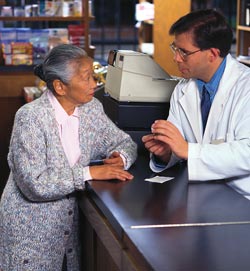
By Shana Potash, NLM Staff Writer
Skip the Coffee, Take a Nap
Want to improve your memory and learning? Take a nap, don't drink coffee a new study suggests. Researchers compared caffeine (the stimulant in coffee, tea, soda, and energy drinks) and naps to see their effect on memory and learning.
Researchers taught people in the study to perform tasks associated with three types of memory: verbal, motor, and perceptual. Study participants memorized words, tapped keys on a keyboard in a particular order, and identified shapes on a computer screen. They were divided into three groups. One group took a nap, another took a pill with caffeine, and the third took a dummy pill with no stimulant. Everyone was then retested on the tasks. The people who napped did better in all three areas than those who had caffeine. The upshot: caffeine either hurt performance or did not improve it.
A team at the University of California, San Diego did the study, which was supported by the National Institute of Mental Health.
Colorectal Cancer Screening: Just Do It
Colorectal cancer is the second leading cause of cancer deaths in the U.S. It can be caused by growths (called polyps) that turn into cancer. Colonoscopies are performed to find problems early. A recent, large study compared a newer technique, known as "virtual colonoscopy," with the standard colonoscopy. The study found the virtual test about as accurate as the standard colonoscopy at finding larger polyps. This method could be an initial screening option for some people.
Virtual colonoscopy uses X-ray and computer technology to create three-dimensional images of the colon. It is less invasive than standard colonoscopy. The standard test uses a long, flexible tube with a camera inserted into the colon. Standard colonoscopy remains the gold standard and is better at finding smaller polyps.
Each method has its advantages and drawbacks. People should talk with their health care provider about which screening method is best for them.
"The most important advice we can give is to get screened," says Dr. Paul Limburg, of the Mayo Clinic in Rochester, Minnesota, one of the study's authors. "How they get screened should be an individual decision based upon discussions between patients and their providers." It is generally recommended that people aged 50 or older be screened.
Researchers at 15 locations across the country did the study, which was sponsored by The National Cancer Institute.
Older Adults Risk Dangerous Drug Combinations
A new survey finds older people in the United States are taking more drugs than ever before. And many seniors may be at risk of dangerous drug interactions.
More than half of older adults use five or more prescription drugs, over-the-counter medicines, or dietary supplements. One in 25 seniors, about 2.2 million people, are in danger of health problems that can happen when certain drugs are taken together.
Researchers say people should let their doctors know about all the drugs and supplements they take. People also should ask their doctor or pharmacist about possible drug interactions when they start taking something new.
The National Institute on Aging, the Office of Research on Women's Health, the Office of AIDS Research, and the Office of Behavioral and Social Sciences Research supported the research.
